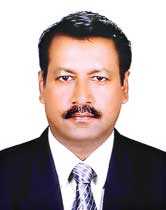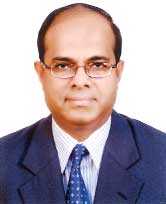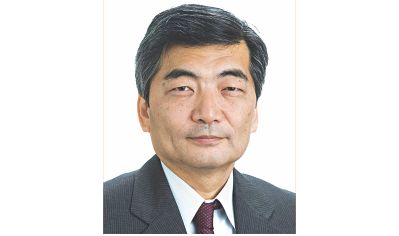Banking
Khurshid made GM of BB
 Md Khurshid Alam has been promoted to General Manager of Bangladesh Bank (BB).
Md Khurshid Alam has been promoted to General Manager of Bangladesh Bank (BB).
Before his new assignment, he was Deputy General Manager of SME and Special Programmes Department of the BB, said a press release Wednesday.
Alam joined the central bank as an assistant director in 1988.
News: The Daily Sun/Bangladesh/11th-Oct-12
Shahid made AMD of Southeast Bank
 Shahid Hossain was promoted to Additional Managing Director (AMD) of Southeast Bank Limited.
Shahid Hossain was promoted to Additional Managing Director (AMD) of Southeast Bank Limited.
Prior to his new position, Shahid was the Deputy Managing Director (DMD) of the Bank, said a press release.
He joined the bank as Senior Vice President in 2003 and subsequently was promoted to Executive Vice President and Senior Executive Vice President in 2005 and 2008.
He started his banking career as a Probationary Officer at National Bank Limited in 1983.
He completed his MSS degree in Political Science from Dhaka University in 1980.
News: The Daily Sun/Bangladesh/11th-Oct-12
Watching Probe in to Alleged GraftWB confirms arrival of experts’ panel Oct 14
The World Bank (WB) Wednesday officially confirmed that an external panel comprising three eminent international experts to oversee probe into Padma Bridge graft allegation will arrive in Dhaka on October 14.
The external panel, headed by Luis Moreno Ocampo, former chief prosecutor of the International Criminal Court (ICC) will work closely with local graft watchdog, the Anti Corruption Commission (ACC), WB said.
The panel was formed on October 5 in line with the measures agreed by the government during the WB’s $1.2 billion loan revival discussion held at Washington.
The multilateral lender pulled out of the project on June 29, alleging a “corruption conspiracy” surrounding the project, for which, it claimed, had “credible evidence.”
Other members of the project are: Timothy Tong, former commissioner of the Independent Commission against Corruption of Hong Kong and Richard Alderman, former director of the UK’s Serious Fraud Office.
Dhaka office of the global lender said this would be an initial introductory visit, and the first in a series of regular visits aimed at assessing adequacy of the investigation into alleged corruption under the Padma Bridge project.
The panel will submit reports to the WB and also share its findings with the government of Bangladesh and other co-financiers of the project, the WB release said.
Earlier, visit of a WB delegation, scheduled on October 1, was postponed without showing any specific reason.
Later, government high-ups said they were informed by the lender that the meeting was deferred as the WB could not form the panel till then. In its board meeting on September 20, the World Bank Group formally decided to engage anew with the project subject to satisfactory implementation of agreed measures.
Apart from the formation of the panel of graft experts, the agreed measures also include creating a separate procurement arrangements for the $2.9 billion mega infrastructure project.
News: The Daily Sun/Bangladesh/11th-Oct-12
NBL organises training on RMRRCM
 Neaz Ahmed, Managing Director of National Bank Limited, speaks at a training course on 'Risk Management and Relevant Reporting and Capital Management' at the Bank’s training institute in Dhaka recently.
Neaz Ahmed, Managing Director of National Bank Limited, speaks at a training course on 'Risk Management and Relevant Reporting and Capital Management' at the Bank’s training institute in Dhaka recently.
A three-day training course on 'Risk Management and Relevant Reporting and Capital Management (RMRRCM)' was held at the National Bank Training Institute in Dhaka recently.
National Bank Training Institute and Risk Management Unit of the Bank organised the course for the executives and officers of the bank, said a press release.
Some 34 executives and officers from head office and branches of the Bank participated in the training course.
Neaz Ahmed, Managing Director of the Bank inaugurated the course as chief guest.
News: The Daily Sun/Bangladesh/11th-Oct-12
Things look positive for Bangladesh: IMF Naoyuki Shinohara, deputy managing director of IMF, speaks on economic growth
 Naoyuki Shinohara
Naoyuki Shinohara
Bangladesh will need to grow by 7 percent to 8 percent a year to achieve its development objectives for the next decade, said Naoyuki Shinohara, deputy managing director of International Monetary Fund.
The skill set of the country's young labour force, along with the basic infrastructure, will need to be enhanced as well, Shinohara said in an exclusive interview with The Daily Star.
“The resilience of the Bangladesh economy over the past several years has been impressive, and GDP growth has been broad-based, thus helping the country achieve 6 percent growth on average.”
The agricultural sector, Shinohara thought, has benefited from the good weather conditions, continued policy support, and better access to credit, as well as favourable price trends.
While export-oriented industries, in particular ready-made garments, propelled the manufacturing sector, with a vibrant private sector taking advantage of the low unit labour costs to expand into new markets.
Finally, services have gained from relatively strong domestic demand bolstered by remittances and new policy initiatives allowing more private participation and increased competition, Shinohara added.
Despite the vast progress made over the past two decades, the fact that a large number of households still live below the poverty line concerns Shinohara.
"The IMF is with the government in its fight against poverty by designing policies that help strengthen governance, reduce waste and excesses, and channel resources to growth-critical areas,” he said.
“We see it as a two-pronged approach: higher income through higher growth and targeted benefits for those most vulnerable to adjustment.”
The government will need to make a concerted effort to ensure the safety net operations reach the society's neediest, Shinohara said.
The government can, however, expect the other development partners to provide vital support in this regard.
He expects the various reform measures taken under the current external credit facility (ECF) arrangement to consolidate higher growth in the medium-term.
Given Bangladesh's young demographic, vibrant private sector and the fact that it is sitting at the crossroads of the world's most dynamic economies, Bangladesh has great potential going forward, according to Shinohara.
"To take full advantage of this, the government will indeed need to generate more internal resources, mainly in the form of tax revenues, in order to remove social and physical impediments to growth."
Despite the global risks, the IMF expects Bangladesh's economy to expand by 5.8 percent in fiscal 2012-13, he said.
The risks associated to this growth outlook stem mainly from the uncertain external environment, he added.
The pace of expansion is expected to be slower than last year, mainly due to the more subdued growth in garment exports and private consumption.
Shinohara said the fund also expects headline inflation to stay in the 7-8 percent range this fiscal year, after coming down from double digits earlier in the year.
"Policy tightening is expected to further reduce the underlying pressures, but new ones could emerge if global food prices continue to rise. Greater exchange rate flexibility has helped absorb external pressures and reverse the decline in reserves we saw in 2011."
Shinohara said if the Eurozone crisis were to intensify Bangladesh's export growth could slow even further, seeing that nearly half of all exports receipts come from the European Union.
"At present, we expect a modest recession in the Euro area in 2012, followed by a weak recovery in 2013."
He said if the global slowdown becomes severe, remittances could also be affected, including those from the Gulf countries.
"Having said this, there could be offsetting effects on the balance of payments. They would arise mainly from a lower import bill due to more restrained imported garment inputs and oil import growth. The impact on the exchange rate would be driven by the supply and demand conditions in the market."
According to the conditions of the three-year ECF arrangement that IMF has approved for Bangladesh in April of this year, the government is committed to undertaking reforms to yield macroeconomic stability, reduce external vulnerability, and, ultimately, achieve higher growth.
In the face of external and fiscal pressures that emerged in 2011, macro-tightening measures have already been put in place.
"So far, the economy has responded well. Bangladesh Bank has been rebuilding its foreign reserves buffer since the early 2012. The government is also committed to moderate fiscal consolidation aimed at preserving stability."
"While we urge the policymakers to remain vigilant in the face of an uncertain external environment, the IMF is also prepared to step in when necessary to ensure programme targets are accommodating of the changing circumstances."
Shinohara said the budget for the current fiscal year provides good support to Bangladesh's macroeconomic stabilisation efforts.
"In our view, revenue targets are reasonably ambitious, factoring in ongoing improvements to tax policy and revenue administration. Expenditure levels are broadly appropriate, although we believe the annual development programme spending is higher than what the current capacity allows."
As a result, a lower-than-budgeted deficit target would be prudent, also factoring in the availability of external and domestic financing.
Shinohara said a major challenge for the government, as in the previous fiscal year, will be to keep subsidy-related costs under control and to ensure safety nets are in place to cushion the impact of administered price increases on the most vulnerable.
"Over the programme period, generating more tax revenues and better prioritising expenditure will also be crucial in reducing poverty and achieving the medium-term growth objectives."
The second instalment of the ECF loan is scheduled to be released in November. An IMF mission visited Dhaka In September to review implementation of the IMF conditions.
"The IMF mission has been generally satisfied with the progress made so far, particularly with respect to the quantitative targets set out under the ECF-supported programme.”
He added that most of the targets were met by the end of June 2012, which was the ECF arrangement's first test date and one of the main bases for going forward.
"However, discussions are still ongoing with the authorities on the forward-looking reform agenda, with further actions needed over the near-term to ensure structural reforms remain on track, notably those related to new VAT and banking legislation."
"Once satisfactory progress has been made in the programme, we would make a recommendation to the IMF's executive board to complete the review. Approval thereafter by our Board of this request would trigger the release of the second disbursement under the ECF arrangement."
The IMF official said the fund expects the government agenda to remain focused on reforms aimed at strengthening the tax policy, revenue administration, public financial management, monetary operations, financial sector and the trade and investment regime.
Under the ECF arrangement, the IMF is already working with the government to improve the taxation system, he added.
Shinohara urged the government to make efforts to woo in investors.
"Pre-election political uncertainty is not unique to Bangladesh. We, however, are confident that the government will remain committed to a reform path for a better future of the country,” he said.
"If this is the case, we believe investors -- both local and foreign -- will continue to pursue opportunities in Bangladesh."
News: The Daily Star/Bangladesh/11th-Oct-12



